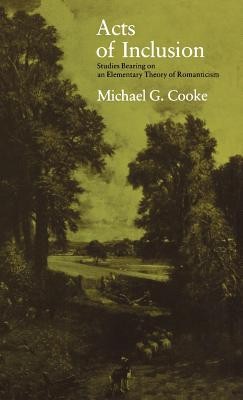
- We will send in 10–14 business days.
- Author: Michael Cooke
- Publisher: Yale University Press
- ISBN-10: 0300023030
- ISBN-13: 9780300023039
- Format: 14.5 x 21.8 x 2.8 cm, kieti viršeliai
- Language: English
- SAVE -10% with code: EXTRA
Reviews
Description
The copious attention visited on romanticism during recent decades has only rarely resulted in comprehensive theoretical constructions. This new work by Michael Cooke, offering an explicit theory of romanticism, is thus both needed and valuable. Cooke proposes that the multifariousness of the movement-found in single works and authors and compounded in the cross-relations among authors-is not an obstacle but a clue to grasping the singular essence of romanticism. The romantic writer, refusing the cloak of hereditary values and forms, looks for value in a context of uncertainty and openness on a principle of essential non-exclusiveness. For anything possible to be posited, everything possible must be taken into account. The concept of inclusion, manifesting itself at almost any level-formal, thematic, generic, rhetorical, actional, or passional-underlies and reconciles much of romanticism's apparent diversity, inconsistency, and incongruity: indeed, romantic literature may be said to constitute acts of inclusion. Cooke explores his thesis in chapters on romanticism and the universality of art; on elegy, prophecy, and satire; on the norm of consequences in romanticism; on the feminine as the crux of value; on the mode of argument, especially in Wordsworth's poetry; and on Don Juan as a test case of romantic form, exhibiting at once the obsession and the self-discipline of spontaneity. Arguing cogently and originally, he comes to terms with a fundamental truth about romanticism.
EXTRA 10 % discount with code: EXTRA
The promotion ends in 21d.22:18:37
The discount code is valid when purchasing from 10 €. Discounts do not stack.
- Author: Michael Cooke
- Publisher: Yale University Press
- ISBN-10: 0300023030
- ISBN-13: 9780300023039
- Format: 14.5 x 21.8 x 2.8 cm, kieti viršeliai
- Language: English English
The copious attention visited on romanticism during recent decades has only rarely resulted in comprehensive theoretical constructions. This new work by Michael Cooke, offering an explicit theory of romanticism, is thus both needed and valuable. Cooke proposes that the multifariousness of the movement-found in single works and authors and compounded in the cross-relations among authors-is not an obstacle but a clue to grasping the singular essence of romanticism. The romantic writer, refusing the cloak of hereditary values and forms, looks for value in a context of uncertainty and openness on a principle of essential non-exclusiveness. For anything possible to be posited, everything possible must be taken into account. The concept of inclusion, manifesting itself at almost any level-formal, thematic, generic, rhetorical, actional, or passional-underlies and reconciles much of romanticism's apparent diversity, inconsistency, and incongruity: indeed, romantic literature may be said to constitute acts of inclusion. Cooke explores his thesis in chapters on romanticism and the universality of art; on elegy, prophecy, and satire; on the norm of consequences in romanticism; on the feminine as the crux of value; on the mode of argument, especially in Wordsworth's poetry; and on Don Juan as a test case of romantic form, exhibiting at once the obsession and the self-discipline of spontaneity. Arguing cogently and originally, he comes to terms with a fundamental truth about romanticism.


Reviews